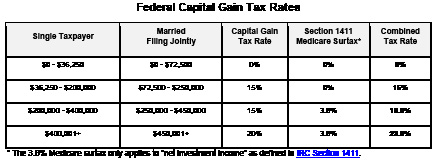The familiar adage, "It's not how much you make, but how much you keep" rings truer than ever for New England real estate investors facing today's high tax rates. Fortunately, IRC Section 1031, a provision in the tax code since 1921, provides critically needed tax relief. Reflected below is a summary of the four ways investors will generally be taxed on the sale of an investment property if they do not take advantage of Section 1031:
1. Depreciation Recapture: First, investors will be taxed at a rate of 25% on all depreciation recapture.
2. Federal Capital Gain Taxes: Next, investors owe Federal capital gain taxes on the remaining economic gain depending upon their taxable income. Investors exceeding the $400,000 taxable income threshold for single filers and married couples filing jointly with over $450,000 in taxable income will be subject to a higher 20% tax rate. The 15% capital gain tax rate generally applies to investors below these threshold income amounts.
3. Net Investment Income Tax Pursuant to IRC Section 1411: When applicable, an additional 3.8% surtax applies to investors with "net investment income" who exceed threshold income amounts of $200,000 for single filers and $250,000 for married couples filing jointly. Pursuant to IRC Section 1411, "net investment income" includes interest, dividends, capital gains, retirement income and income from partnerships (as well as other forms of "unearned income").
Scott Saunders is senior vice president and Lynne Bagby, CES, is New England division manager of Asset Preservation, Inc., Boston.
4. State Taxes: Last, investors must also take into account the applicable state capital gain tax, if any, to determine their total taxes owed.
Despite high overall taxes owed when combining these four levels of taxation at the disposition of an investment property, one aspect of the tax code provides real estate investors in New England with a huge tax advantage. Section 1031 allows property owners holding property for investment purposes to defer taxes that would otherwise be recognized upon the sale of investment property. Savvy investors in Massachusetts and nationwide use 1031 exchanges to deploy their investment capital into better performing investment properties.
Tags:
Capital gain tax rates "Exchanges defer the 3.8% investment income tax and 20% capital gain tax"
April 24, 2014 - Spotlights











.png)